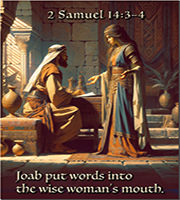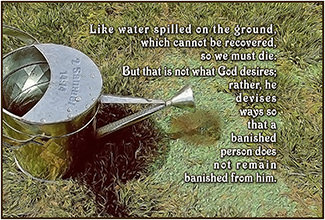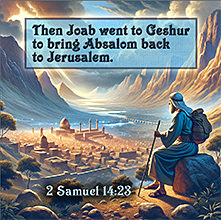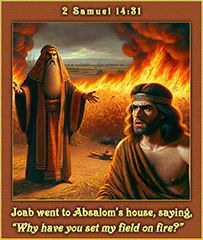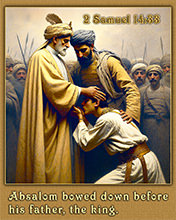2 Samuel 14:1–33 . . . Bible Study Summary with Videos and Questions
“Absalom Returns to Jerusalem”
Following last week’s account of Absalom murdering Amnon (see Week 49’s summary), it’s likely that Joab (David’s commander-in-chief and nephew) concluded that it would be politically better for David and Israel if David brought Absalom back to Jerusalem from Geshur (cf. vv. 7, 13–15). Absalom was, of course, then David’s heir to the throne by custom, though Yahweh had designated Solomon to succeed his father (1 Chronicles 22:6–10). David had a great love for Absalom, despite having been a murderer (v. 1). David had a large capacity to love God and many people greatly. Often, people who love greatly find it difficult to confront and discipline those they love.
We’ll soon read the tale that Joab asked the “wise woman from Tekoa” (6 miles south of Bethlehem; see map) to tell King David. It resembled David’s problematic situation with Absalom (see the sad parable that Nathan told David, 12:1–4). In this chapter’s tale, by putting a brother’s murderer to death, the woman’s hostile relatives would have deprived her of her means of support (vv. 5–7). If David put Absalom to death, David would have deprived himself of his heir, which Joab evidently thought Absalom to be. Since David promised not to execute the woman’s son (v. 11), it would be inconsistent for him to refrain from pardoning Absalom (v. 13). The wise woman then urged David to remember the LORD his God, specifically, God’s mercy (v. 11).
In the second half of this chapter, we’ll learn if Joab’s ruse proved effective, possibly enabling David to permit Absalom’s return to Jerusalem. We’ll also read the story of a father and king caught between his responsibilities to be just while being merciful.
[Note: Click the link to This Week’s Passage near the bottom of this page to read today’s Scripture.]
Joab Schemes to Secure Absalom’s Pardon (2 Samuel 14:1–23)
A “wise woman” (v. 2) posed as a widow with two sons, one of whom killed the other. People insisted that the remaining son be killed. David saw injustice in that, but hadn’t yet realized that the story was about him. He’d promise to protect the remaining son.
This is a woman who was a good enough actress to pull off Joab’s ruse, sharp enough to think on her feet, and wise enough to keep from offending the king while still pressing her point home — not an easy task. Joab told the woman to dress as if she were a widow who’d been mourning a long time. She was then to ask for an audience before the king to plead for justice, explaining that her sons had gotten into a fight and one killed the other (vv. 2–20).
Further in her story, her clan demanded that the murderer-brother be put to death for his crime. The result would be that neither son would be alive to take care of his mother. And, since women didn’t normally inherit property, her husband’s inheritance would go to others, she’d be destitute, and her husband’s name and descendants would be cut off.
Her story had been carefully devised to gain David’s sympathy. She was mourning for a son; so was he. Her murdering son was to be killed, but that would have left her fully bereaved, deprived of a loved one due to his death. David felt her hopelessness and he wanted to help. “Go home, and I will issue an order in your behalf,” he said (v. 8). Thereafter, David swore that he’d protect the son from anyone seeking blood vengeance. “As surely as the LORD lives,” he said, “not one hair of your son’s head will fall to the ground” (14:11b). She had the king firmly on her side and was prepared to spring the trap. So she asked permission to speak freely; then she confronted the king directly regarding Absalom, as demonstrated in these two verses.
13“Why then have you devised a thing like this against the people of God? When the king says this, does he not convict himself, for the king has not brought back his banished son? 14Like water spilled on the ground, which cannot be recovered, so we must die. But God does not take away life; instead, he devises ways so that a banished person may not remain estranged from him” (2 Sam. 14:13–14).
The woman admitted that this was so, concluding with sweet words designed to turn away any anger: “My lord has wisdom like that of an angel of God — he knows everything that happens in the land” (v. 20). Incidentally, the woman’s references to “the people of God” (i.e., Israel, v. 13) point to popular support for Absalom and a common desire that David would pardon him, allowing him, the banished son, to return to Jerusalem.
David had personally experienced God’s mercy, having escaped the penalty of death for his adultery and murder (12:13). The wise woman appealed to David to deal with Absalom the same way that God had dealt with him; otherwise, the nation would suffer (v. 14). The wise “actress” reminded David that God doesn’t take away life or delight in punishing people. Rather, he plans ways by which guilty people can enjoy reconciliation with him; the Cross of Christ is the greatest historical proof of this truth.
Judgment is God’s “strange” work (Isaiah 28:21); mercy is what he delights in displaying. Thus, David should be godly and make a way to show mercy to Absalom, rather than punish him with death, according to Joab. Clearly, David knew that Joab wanted him to pardon Absalom. He sensed that the woman’s arguments had come from him (vv. 18–19). After all, Joab had written the script for this skit that she’d performed on his behalf (vv. 19–20).
David rightly seems to have “smelled a rat” as his encounter with the woman from Tekoa came to its conclusion; that “rat” was Joab. When pressed to tell the “whole truth and nothing but the truth” (that Joab was in fact the rat), the woman told David that it was all Joab’s idea, and that she was reluctant to carry out his plan. She seems almost relieved that her deception had ended, telling David that Joab orchestrated the entire staged incident in order to “change the present situation” (v. 20).
Joab’s later actions (plus some of his earlier ones, like murdering Abner) seem to betray an ulterior motive on his part. David’s love for Absalom almost seems to be a weak spot that Joab sought to exploit for his own benefit. David’s lack of true forgiveness bred bitterness in Absalom, resulting in his organizing a coup to overthrow his father (chapter 15). In a few more weeks, we’ll see in chapter 18 that, in Absalom’s rebellion against David, we hardly hear of Joab. Absalom will instead make Amasa the commander of Israel’s army (i.e., the army of those who’d choose to follow Absalom). When David will fight Absalom and his forces, Joab won’t apparently act as the commander of all the army but commander of only a third of David’s forces (2 Samuel 18:2). Stay tuned!
David’s Restoration of Absalom (vv. 24–33)
Joab’s planned skit worked. Reluctantly, David gave in to Joab’s prodding. He told Joab that he would bring Absalom back to Israel. The assumption was that he wouldn’t allow anyone (any avenger) to take Absalom’s life. But somewhere along the line, David considered what his son had done, so he changed his plans. Absalom wasn’t to be brought back to Israel as an “innocent man,” free to come and go as he pleased. Instead, Absalom was to be under “house arrest,” confined to Jerusalem and his own house. Seeing the logic in it, David told Joab to bring Absalom back to Jerusalem, but on one condition: “He must go to his own house; he must not see my face” (v. 24a).
We should understand from vv. 25–27a why Absalom was able to win the hearts of the people. He wasn’t only handsome but also a family man. The author paints an appealing picture of Absalom, helping us to understand why so many people began to like Absalom and shift their loyalty from the father to the son. Absalom had a great deal going for him: good looking, without a single flaw. His hair was his crowning glory, and everybody knew it. A strong growth of hair was a sign of great manly power. He had three sons and a beautiful daughter who added to his standing. We’re about to see, due to Absalom’s very careful and deliberate scheme, how he’ll gain full freedom. He was seen as a perfect choice to be David’s successor. But he was still out of favor with the king.
28Absalom lived two years in Jerusalem without seeing the king’s face (2 Sam. 14:28).
Absalom came home a free man, essentially pardoned for murdering Amnon the crown prince. But since the king refused to readmit him to the court, it was clear to everyone in the kingdom that Absalom was out of favor with the king. No one wanted to associate with a person under such a cloud. He was home from exile, but the stalemate would continue for another two years (v. 28).
It was Joab who’d helped Absalom return from exile. Now, after two years of house arrest, it was Absalom who needed Joab to help him be restored to the king’s favor. Absalom became more and more frustrated since he couldn’t leave his house. During both years he resented David’s treatment of him so he summoned Joab but was ignored; Joab refused to see him and wouldn’t “return any of his calls,” attempting to gain an audience with Joab in his home. As a result, Absalom took more extreme measures. He sent his servants out to set ablaze Joab’s barley field (which adjoined his own field). This certainly got Joab’s attention! (Enlarge image to the right.) Joab was soon at Absalom’s house to confront him. But instead, it was Absalom who confronted Joab. He likely wondered why he’d been confined to his quarters. And if that was all there’d be for him, he figured he’d be better off living in Geshur, where he could be a free man. As a result, Absalom directly and boldly demanded Joab to enable him to speak with the king, face to face (vv. 32–33).
It’s what Absalom said next to David that might be viewed as most troubling: “. . . and if I am guilty of anything, let him put me to death” (v. 32b). It sounds a little bit like these familiar words: Give me liberty, or give me death! But how could Absalom have spoken that way? Did he really believe he was without guilt? Didn’t he think himself worthy of the death penalty? It would seem so. Assuming that that was the case, Absalom would then reveal, yet again, that he had no regard for God’s law. In his eyes, he wanted the death penalty for Amnon, though the law didn’t require it. He thought that the death penalty was harsh and inappropriate for him, though he was an actual murderer under the law, a man who manifested absolutely no interest in or desire for repentance.
In the next scene we see in v. 33, where King David finally receives and kisses his son Absalom, marks the end of a two-year period of deliberate, unresolved separation after Absalom’s return from exile. This delay in full reconciliation is considered by many commentators to be a critical failure of kingship and fatherhood that ultimately fueled Absalom’s subsequent rebellion. David’s demand of Joab had the desired effect. Perhaps Joab realized that David wanted to reconcile with his son and that that would be good for the kingdom. When Absalom pressed for a personal reconciliation with his father, David finally conceded (v. 33), which David should have done at least two years earlier. Sadly for David, he couldn’t foresee that Absalom would soon try to usurp the kingdom from his father.
Looking at the text of these few verses, Joab effectively relayed Absalom’s message to David. Absalom apparently told the king what he wanted to hear and was subsequently kissed by his father the king (v. 33). That kiss was the sign of David’s restored favor of his son Absalom, whom he loved — despite what he’d done. He realized that it was good to have Absalom home again. David probably felt like the father in Jesus’ Parable of the Prodigal Son (Luke 15:11–32). Like that father, David was also ready to celebrate his son’s return with a genuine hug and kiss!
Closing Considerations about David’s Gradual Decline
Let’s step back to look at the bigger picture. In his early years, David was strong in faith — the ultimate warrior, a hearty man full of a holy boldness. Moving from Hebron to Jerusalem, he built an empire from Egypt to Mesopotamia.
We’ve now witnessed a David who’d become corrupt and soft because of his wealth, his victories over all his enemies, his absolute power, and from his lack of purpose. The once-righteous king had become compromised. Though his relationship with God had been restored, his weaknesses began to take their toll. He’d been coasting on his achievements and faith during his vital years. He’d become a victim of court intrigue and his chosen accommodations to make to stay in power and be able to reward his supporters. Instead of being a player, David had been played. . . by Joab, by Amnon, and by Absalom.
One of David’s most serious problems was his inability (or unwillingness) to discipline his family and his officers: Joab, it seems, was allowed to get away with murder, even if it worked directly against his king’s interest in uniting the kingdom; Amnon got away with committing familial rape; Absalom got away with killing Amnon the crown prince. David was seemingly incapable of restoring order to his family and his kingdom. His subjects weren’t stupid; they saw the decline in his character. No doubt, they began to comment about it to one another.
† Summary of 2 Samuel 14:1–33
This passage recounts Joab’s efforts to bring about a reconciliation between King David and his estranged son Absalom, following Absalom’s murder of his brother Amnon. Joab, aware of David’s longing for Absalom, orchestrates a plan by sending a wise woman from Tekoa to present the king with a parable about two sons — one having killed the other — to elicit David’s sympathy and indirect consent for Absalom’s return (14:1–20). David perceives Joab’s hand behind the woman’s speech but nevertheless allows Absalom to return to Jerusalem, though he forbids him from entering the king’s presence, resulting in two further years of estrangement within the same city (vv. 21–24).
The narrative then highlights Absalom’s remarkable appearance and growing frustration with his partial restoration, as David still refuses to see him (vv. 25–28). After repeated attempts to gain Joab’s attention are ignored, Absalom resorts to setting Joab’s field on fire, compelling Joab to intercede with David on his behalf (vv. 29–32). The chapter concludes with David finally permitting Absalom to appear before him, and Absalom bows at his father’s feet, receiving the king’s kiss — a gesture of reconciliation, though underlying tensions persist (v. 33).
Key points with verse references:
• Joab realizes King David longs for Absalom and enlists a wise woman from Tekoa to persuade David through a parable mirroring his own situation (vv. 1–20).
• The woman presents a story about two sons, prompting David to show mercy, and then applies it to Absalom’s case, revealing Joab’s involvement (vv. 13–20).
• David agrees to Joab’s request and allows Absalom to return to Jerusalem but refuses to let him see the king’s face for two years (vv. 21–24).
• Absalom, described as exceedingly handsome and the father of three sons and a daughter named Tamar, grows impatient with his isolation (vv. 25–28).
• Absalom sets Joab’s field on fire to force a meeting, resulting in Joab securing Absalom’s audience with David, who finally receives Absalom and kisses him (vv. 29–33).
This chapter explores the complicated dynamics of justice, mercy, and unresolved family conflict.
This Week’s Passage
2 Samuel 14:1–33
New International Version (NIV) [View it in a different version by clicking here; also listen to chapter 14 narrated by Max McLean.]
Summary Video: “The Second Book of Samuel”
† Watch this introductory video clip created by BibleProject on bibleproject.com.
- Q. 1 Why do you think Joab conspired to get David to bring Absalom home?
- Q. 2 Why didn’t David immediately show his favor of Absalom?

